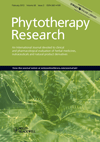In Vitro Cytotoxic Effect of Ethanol Extract Prepared From Sporophyll of Undaria pinnatifida on Human Colorectal Cancer Cells
Abstract
Brown seaweed Undaria pinnatifida (Harvey) Suringar is popular as a foodstuff, and used for medical care in East Asian countries. The major components of this seaweed are shown to benefit hypertension and hyperlipidemia, and considered to reduce the risks of infarction and ischemic diseases. Furthermore, the intake of dietary fiber of seaweeds is considered to prevent the production and proliferation of cancer in the gastrointestinal tract. The direct effect of an ethanol extract prepared from Undaria pinnatifida sporophyll (mekabu) on HCT116 human colorectal cancer cells was examined, and the mekabu extract was shown to induce the non-oxidative apoptotic damage to the cells, thus resulting in the reduction of their viabilities in a concentration-dependent manner. Moreover, the cytotoxic effects of carcinostatic drugs, such as 5-fluorouracil (5-FU) and irinotecan (CPT-11), were observed only in the medium containing sera, while the mekabu extract could effectively reduce the cell viabilities even in the serum-free medium. These findings suggest that the mekabu extract may contain a potential active substance inducing the non-oxidative apoptotic cell death probably through a mechanism different from those of 5-FU and CPT-11, and hence mekabu is possibly useful as an auxiliary drug to the chemotherapy of colorectal cancer. Copyright © 2011 John Wiley & Sons, Ltd.




